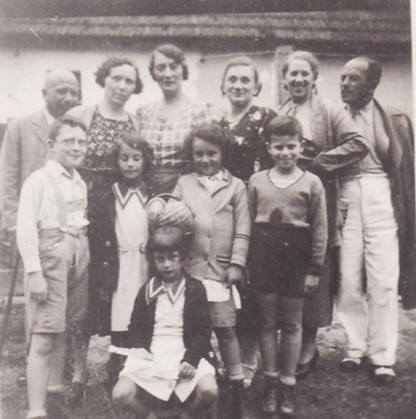*All names and personal details have been changed to preserve with the privacy of those involved
Where was Eli’s* grandfather born in Romania and what is the connection to a family tree from the United States?
The research question as it turned out in the first conversation with Eli * was:
Where were Eli *’s grandparents born in Romania?
Who were the family members who lived in that area?
How did we start with the genealogy research?
Eli planned on starting a genealogy research in the region of present-day Romania. This area was formerly under Hungarian control. Eli had only few pages of testimony written by his father and a certificate of citizenship of his father’s uncle. In addition, Eli has a document that was used to claim property of his grandparents from the Romanian government, from 1946. Property that was stolen or destroyed during the Holocaust. The document was printed immediately after the war when the surviving grandparents returned to their home in Romania. The document is written in Romanian and was used to claim the return of property or compensation for property that was stolen or destroyed during the Holocaust.
The value of old documents in genealogy research
In genealogy research we find various documents kept in archives or with relatives. Relatives kept the documents as they valued it. They kept them for future generations. But there are reverse cases where at the death of a relative who held his own private archive, his relatives decided that they did not need these documents and unfortunately, destroyed them. On the other hand, descendants who inherited documents do not always know how to evaluate the information given in the documents until the question of genealogy research arrives and a deciphering of the document is requested.
This was also the case with Eli who was looking for details about his grandparents. Eli has a property claim document written in the Romanian language which Eli cannot read or understand. Eli kept the document and even distributed it among the family members, but the lack of appreciation of the information in it probably stemmed from the fact that the official document and the property claim did not result in the family compensation for the stolen property. Still, Eli and his family kept the document anyway. Perhaps in future generations conditions will change.
Translation and decoding of documents in the framework of genealogy research
While examining Eli’s grandfather’s property claim document I found the grandparents’ names as well as their birth dates. Although what was written in the document was printed and not handwritten, it was not clear at first what the data in the rest of the document meant (handwritten documents pose a significant challenge, even if the language is known). Following further translation work I discovered the names of the grandparents’ birthplaces. Solves the research question but a new question arises.
What did we discover in the prosecution document in the genealogy study?
The property claim document states that the grandfather’s date of birth is April 21st and the official documents provided to me by other sources state the date of birth on September 21st. How can such a difference be explained in birth date records? One of the simpler explanations is that in the handwriting the number nine and the number four are quite similar and one can get read April as September or vice versa. There are other reasons for differences in dates like the desire to evade military service and various other reasons.
In Eli’s case the question of where Eli’s grandparents were born in Romania was answered pretty quickly. To continue the genealogy research one has to locate the place of birth in its name today. The change of government in different areas also led to a change in the names of the places. In addition, the place where the civil records were made and kept (birth, death and marriage records) must be located. The place of registration is extremely important for the continuation of the genealogy research and for the updates of Eli’s family tree.
What else did we find for Eli and his family? In another post…
Zvika Oren, genealogist, specializes in family tree preparation
Over the years I have gained knowledge and experience in various areas of genealogy research: searching records, deciphering documents and tombstones, conducting personal interviews, discovering pedigrees, contacting relatives and people with relevant knowledge, collecting findings and organizing them, transferring documents and photos to digital media (including making backup copies) , As well as the production of a family book (Hebrew or English) based on the material collected.
As part of the genealogy research and family tree building, I collect data and search for more data and information in digital information sources: Yad Vashem databases, search engines, locating tombstones, various archives, immigration records, documents regarding name changes and more. I have conversations and interviews with people for the purpose of genealogy research. At the end of the data collection I process information related to the relevant root research. All in all – to discover the genealogies and to collect the documents and photos, to document the preservation and construction of the family tree.







